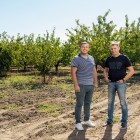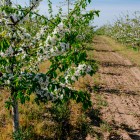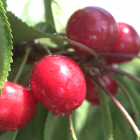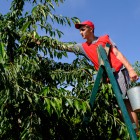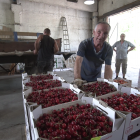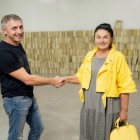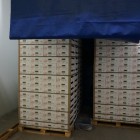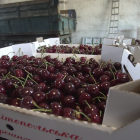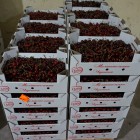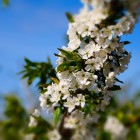
A quarter of all Ukrainian sweet cherries are grown in the Zaporizhia region, with more than half of local cherry orchards located in Melitopol District. In an area of more than 1,300 hectares, they have been growing for decades some of the world’s finest cherries that are famous far beyond Ukraine. Elite cherries with a unique balance of sweetness and bitterness have become the primary source of income for many residents of Melitopol. Recently, growers wanted to know how they could export their fantastic cherries and get them officially recognized in the European market.
In 2017, Melitopol City Council approved a program to promote local produce in foreign markets developed with Partnership for Local Economic Development and Democratic Governance (PLEDDG) project, which is implemented by the Federation of Canadian Municipalities with the generous support of the Government of Canada. The program was set up to enhance the city’s export potential, promote local producers, and launch the the Melitopol Cherry Growers’ Association, an non-government organization (NGO), which was established in 2019. The association initiated a crucial step toward the development of local businesses, namely the registration of the appellation of origin of sweet cherries. It is a powerful tool that will help association members protect rights to their products, enhance their value and make them more recognizable, while also substantially expanding opportunities for exports.
With PLEDDG support, the association worked with agricultural producers, agronomists, and selection breeders to develop standard specifications for locally grown sweet cherries. Official registration of the appellation of origin was finalized in September 2020, which means that the Melitopol sweet cherry has become an international brand – the first Ukrainian fruit entitled to recognition in the European Union.

The supervisory board of the association will monitor business owners for compliance with the specification requirements. Special-purpose equipment to test the quality of sweet cherries and the sugar content was purchased with PLEDDG support. The equipment was successfully tested this year jointly with university laboratory personnel, and beginning with the next season it will be fully used to monitor the quality of products grown by association members. The association is also drafting an exporter’s roadmap for business owners. It will cover all of the points to be considered when preparing sweet cherries for sale outside Ukraine, such as choosing the appropriate containers, packaging the cherries correctly, applying the newly designed Melitopol cherry logo and the association logo, as well as markings showing the time and exact location where cherries were picked.
Training is an essential step toward helping local business owners expand to export markets. In the fall of 2020, they attended numerous workshops to facilitate their transition to using the common conditions and rules of cherry cultivation, product quality control methods, certification of their production facilities in accordance with EU standards, among others.

Eight farms are currently members of the association, but their number will grow: the region is home to some 80 cherry growing businesses that can potentially join in. Some business owners do not fully understand the mechanism by which the association operates and the advantages of pooling their resources. However, there are also active young people who appreciate the value of the association’s initiatives and eagerly support them.

“I have been in the business of growing sweet cherries, apricots, and peaches for more than 16 years and have been running a farm for almost nine years. I was among the first to join the Association. I joined in the development of the Melitopol cherry specifications and helped raise awareness among other local farmers and brought them in.
My years-long experience shows that unscrupulous competititors are a very common phenomenon in the cherry market: buyers can be duped into buying any cherry variety as Melitopol cherries. There are no holds barred in this business: they import sweet cherries all the way from Kazakhstan and sell them here as Melitopol cherries. That’s why I strongly support the cause taken up by the association, namely registration of the appellation of origin. This will enable Melitopol business owners to make an official statement about their product and ramp up their capacity to the fullest. I believe that we will export our products to the European market successfully. We find it important to export cherries not as a raw material but specifically as an end product. By selling our products at higher prices, we will bring money into the Ukrainian economy and support people working with us in Melitopol. In the long term, we will step up our output volumes and create new jobs,” says Tymur Mekhtiyev, Owner of a Melitopol-based farm and member of the Melitopol Cherry Growers’ Association.
The launch of the brand with the appellation of origin “Melitopol Cherry” will not only enhance the image of Melitopol as the cherry capital of Ukraine but will also encourage local farmers to cooperate with the Melitopol Cherry Growers’ Association. The growing output of quality cherries and their exports will in turn contribute to the region’s economic stability and help raise living standards of local residents.
PLEDDG is actively supporting the creation and operations of business associations in partner cities, having provided assistance to ten associations over the past six years. After all, successful associations of business owners serve as a catalyst for the development of local business climates and infrastructure, increase government accountability, make local communities more active, and promote access to international markets, which collectively guarantees economic growth in Ukraine.
| Download success story Melitopol Cherry brand goes international in pdf. |


